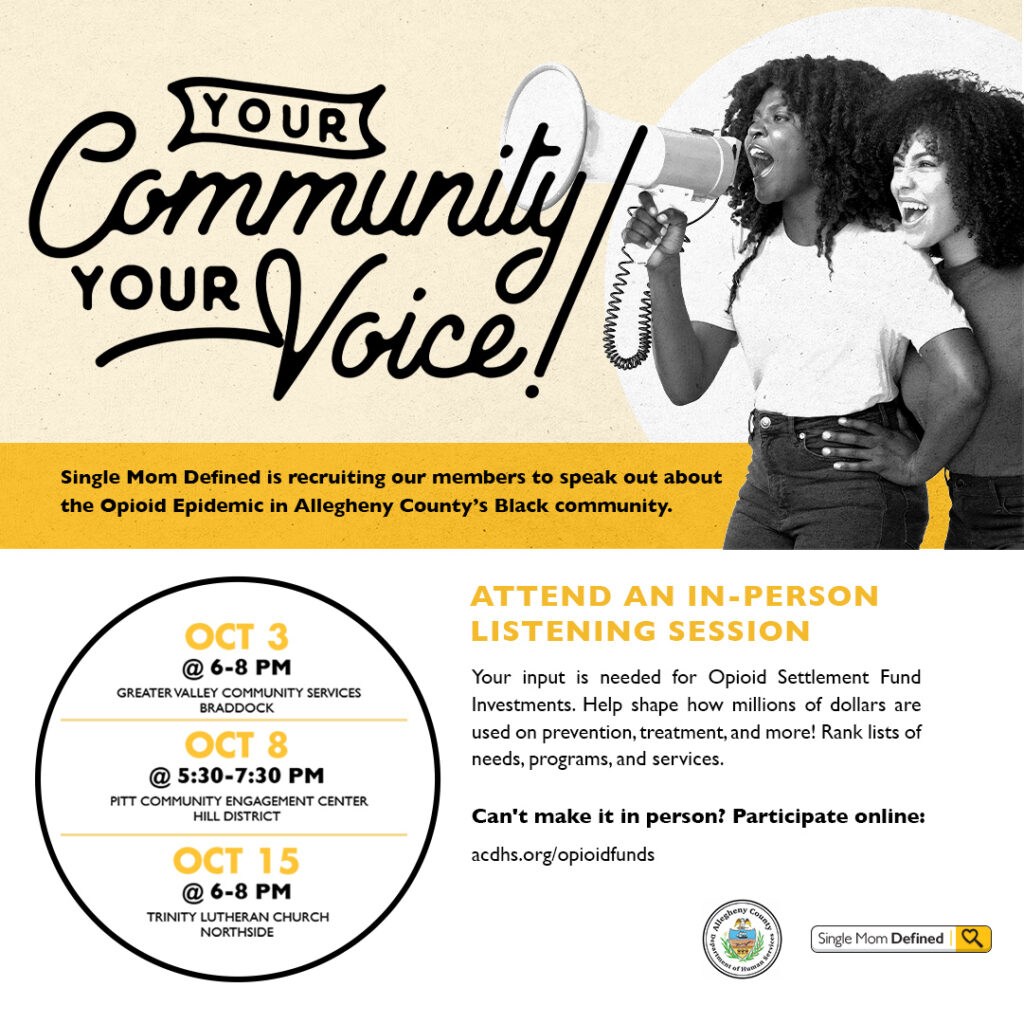The opioid epidemic has affected communities across the country, leaving devastation behind in the form of addiction, deaths, incarceration, and more. While this epidemic has touched people from all walks of life, Black communities have disproportionately felt the blow. The intersection of systemic racism and socioeconomic disparities has exacerbated the toll on Black Americans. This includes residents right here in Allegheny County.
Your Voice Matters In Allegheny County
The opioid epidemic has greatly impacted the Black community in Allegheny County.
Residents are being asked to share their thoughts on the most effective ways to fight this continuing crisis.
A series of listening sessions are scheduled in neighborhoods most impacted by substance use and overdose deaths. During the meetings, residents will rank their most pressing needs and suggest ideas for programs and services.They’ll also be asked where they think Allegheny County should invest the millions of dollars it will receive from national opioid settlement funds for prevention, harm reduction responses, treatment and recovery, education and research.
The listening sessions are scheduled to take place:
- October 3, 2024 at 6 PM at the Greater Valley Community Services, Braddock
- October 8, 2024 at 5:30 PM at the University of Pittsburgh Community Engagement Center, Hill District
- October 15, 2024 at 6 PM at Trinity Lutheran Church, Northside
Refreshments will be served. Child care will not be offered.
You can register to attend listening sessions and participate in the survey by visiting engage.alleghenycounty.us.
 The National Opioid Settlement Funds
The National Opioid Settlement Funds
Pennsylvania is set to receive $1 billion, with Allegheny County getting $90 million in annual payments, ranging from $4-10 million through 2038. To date, the county has received $8.3 million, which it invested in treatment and prevention efforts.
Systemic Factors
The current opioid crisis has reached unprecedented levels, fueled by the overprescription of opioids, synthetic opioids like fentanyl, and the illegal drug trade. SInce Black communities have historically faced systemic discrimination and marginalization, residents are at risk for higher rates of chronic diseases, limited access to quality healthcare, and exposure to environmental hazards. Such factors have made Black individuals more vulnerable to the opioid epidemic. Systemic racism has contributed to economic inequality, forcing many Black individuals to live in poverty and face limited opportunities for employment. These factors have increased the likelihood of turning to drugs as a coping mechanism.
The Role of Prescription Opioids
Initially, the opioid epidemic affected predominantly White communities, but in recent years, the country and the county experienced significant increases in opioid-related deaths among Black and Latinx residents. Since 2018, fatal overdose rates among Black residents in Allegheny County have tripled while rates among Whites have leveled off.
Sarah, a member of the Single Mom Defined community and resident of Allegheny county, can attest to how disparity in treatment and care led to her mother becoming addicted to opioids. Because of a lack of access to proper pain management, her mother fell victim to what she calls doctor shopping and illegal ways to get pain pills.
“Pharmaceutical junkie” was the name a family member nicknamed my mom before I was old enough to understand what that meant. For most of my life, my mom was addicted to opioids. Her addiction started when she was prescribed narcotic pain relievers. My mom was given OxyContin when it was first introduced to the public. When I was 19, I had a serious injury and was hospitalized. My mom came to visit me, but kept dozing off, because she was so high from the pills. She was literally falling asleep mid sentence, but I was coherent, despite being on a morphine drip. She got to the point where she tried to find illegal ways to obtain the pills when she couldn’t get them from doctor shopping. At one point, she was using other substances to feed her addiction. In 2019, my mom was gravely ill. Even after her body had started the process of transitioning, her brain was still craving the narcotics. Some of her last words were asking for pain pills. I believe more should have been done to help her and all those who became hooked on opioids as a result of being prescribed medication by a doctor. My siblings and I suffered because of our mother’s addiction. I had to rush my unconscious mother to the emergency room so many times that I lost count.
Sarah believes the settlement funds should be spent on treatment programs for those experiencing addiction and support programs for families impacted by the epidemic.
Children often lose their parents, even if they don’t die of an overdose. Children need resources set aside for counseling programs. The Center for Victims of Violent Crimes helps families with funeral expenses. The same should be done to help cover the cost of funeral expenses when a loved one dies because of an opioid addiction. Money should also be spent on education, especially for first responders like police officers. And funds should be invested in programs that offer mental health care, because addiction is a mental health issue, and people suffering from addiction disorders may struggle with other mental health issues as well.
Samantha, whose name has been changed to protect the identity of her ex-partner, is also a member of the Single Mom Defined community and Allegheny resident who shared how the opioid epidemic came close to home.
In 2016, I reconnected with my first love from middle school. He was battling an addiction to opioids and wanted to get clean. I connected him to my church, which had a recovery program for people battling addiction. They assisted him right away and transferred him to an out-of-state location to start the process of detox. He was there for 30 days before he got kicked out for breaking a rule. He returned to Pittsburgh to live with me and did well in the first nine months of our relationship, or so I thought. He had secured a job, enrolled in school, and was working on his parenting skills with his children’s mother.
When he landed a job at a restaurant and received a pay hike, things took a turn for the worse. He began smoking weed and drinking alcohol, which eventually led to him using opioids once again. He would steal my money, my car, my children’s electronics and disappear for days at a time. I tried to be supportive but he became verbally and physically abusive. I begged him to stop using, and he threatened to inject me with opioids if I didn’t support him. At that moment, I decided that our relationship was not worth me losing everything I worked hard for. I put his belongings outside on my porch and changed the locks. He lived in my backyard for three weeks until a relative came to get him. About six months later, he broke into my house and stole electronics and cash. I grew up in a drug-infested environment as a child, so I continuously blamed myself for exposing my children to danger. From that day on I decided to be single and focus on healing the damage done mentally to my children and mentally and physically to me.
Samantha believes that opioid settlement funds should be spent on educational programs to prevent opioid addiction.
I wish there was a way to prevent addiction. A lot of people turn to drugs and alcohol as a coping mechanism. I wish schools taught students healthy coping skills so that drug abuse would not lead to addiction.
The opioid epidemic is a complex and multifaceted issue that requires a coordinated effort from policymakers, healthcare providers, community leaders, and individuals to address its devastating consequences. By recognizing the unique challenges faced by Black communities in Allegheny County and implementing effective strategies, we can help reduce the impact of the opioid epidemic, rebuild current communities, and protect future generations against opioid abuse.
If you are unable to attend a listening session, your voice can still be heard! Take the survey today and share how you think the county can fight this battle that is hitting home for many of our moms.
Heather
Not long ago, Heather Hopson lived in the Cayman Islands and hosted a television show. Today, she’s back home in Pittsburgh writing a different type of story as the founder of Motor Mouth Multimedia and Single Mom Defined. Utilizing more than a decade of television news reporting experience, Heather assembles teams to tell diverse stories, provide unique perspectives, and increase the visibility of important issues for local and national clients. In 2018, Heather, inspired by her daughter, produced Single Mom Defined, a photo essay and video series that provides a more accurate definition of single Black motherhood than the one society presents.
Heather obtained a BA in Journalism from Michigan State University, where she served as president of the Delta Zeta Chapter of Alpha Kappa Alpha Sorority, Inc.



